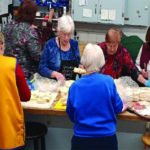Home »

Falls don’t discriminate – be prepared in winter
More people fall during our cold, Canadian winter than during any other season.
No one is immune to falls, yet the consequences of falls differ markedly across age groups.
At 25, you may only injure your dignity; at 45, you may break your wrist; and above 65, you may suffer a serious fracture or head injury. Nevertheless, it takes but a second, and a fall for anyone could mean long-term rehabilitation, permanent disability, or death.
When weather gets treacherous, take these steps to keep safe:
- Shovel your driveway, walks and stairs. This is an obvious one but not to be neglected. It’s also the neighbourly thing to do. Keep an eye out, too, for neighbours who are elderly or who have a disability, and lend a hand if needed. With changes in temperature, a freeze-thaw cycle can make for extremely icy conditions. Spread salt or sand to reduce the risk of a fall.
- Wear good footwear. Not all footwear is made equal. Even winter boots differ in the amount of slip resistance they offer. To find ratings on specific footwear, visit the Toronto Rehabilitation Institute’s website, Rate My Treads. Ratings go from zero to three snowflakes, with three snowflakes offering the most grip. However, be cautious with cleats and spikes designed for outdoor icy conditions as they can increase your risk of falls on other indoor surfaces
- Stay active. This is counter-intuitive advice since getting up and getting moving would seem to put you at risk of a fall. Yet a more sedentary lifestyle—more likely in the winter months—leads to muscle loss, which decreases strength and balance. So if walking outdoors is not an option, walk indoors at your local mall, for example, or even in the hallways of your house or apartment building. Swimming at your local pool is another excellent way to stay limber. Mobility is medicine—take it every day!
- Helmets, helmets, helmets. Tis the season for skating, skiing, snowboarding, and snowmobiling. For these and other activities, wear a helmet. Helmets look fashionable, keep you warm, and most importantly protect your brain. Adults, set an example for your kids: don a helmet by default.
- Be present in your body. Proprioception is our sense of our body’s position in space, including our sense of balance. This sense suffers from the many distractions in our day, not least of which our smart phones. Avoid rushing and “multi-tasking”. Be mindful of where you put your feet and tune in to your surroundings when you are walking.
- Eat and drink for good health. Eat healthy foods and drink plenty of water—poor nutrition and dehydration can cause dizziness.
- Mind your medications. Taking more than five medications increases your risk for falling and some medications can make you feel dizzy or drowsy. If you think your medications are making you unsteady, be sure to tell your doctor, nurse practitioner or pharmacist right away. Don’t stop taking your medication without speaking with them first.
Lastly, quality of life is key. To partake in the activities we enjoy often entails a level of risk. We cannot completely eliminate risk, but through these steps we can greatly decrease our chances of a fall. May you enjoy the winter season and stay safe!
For more information about fall and injury prevention, visit the fall prevention site www.findingbalancebc.ca and the Your Health section at www.interiorhealth.ca.
– Kelly Wilson is Interior Health Quality Consultant, Falls and Injury Prevention








